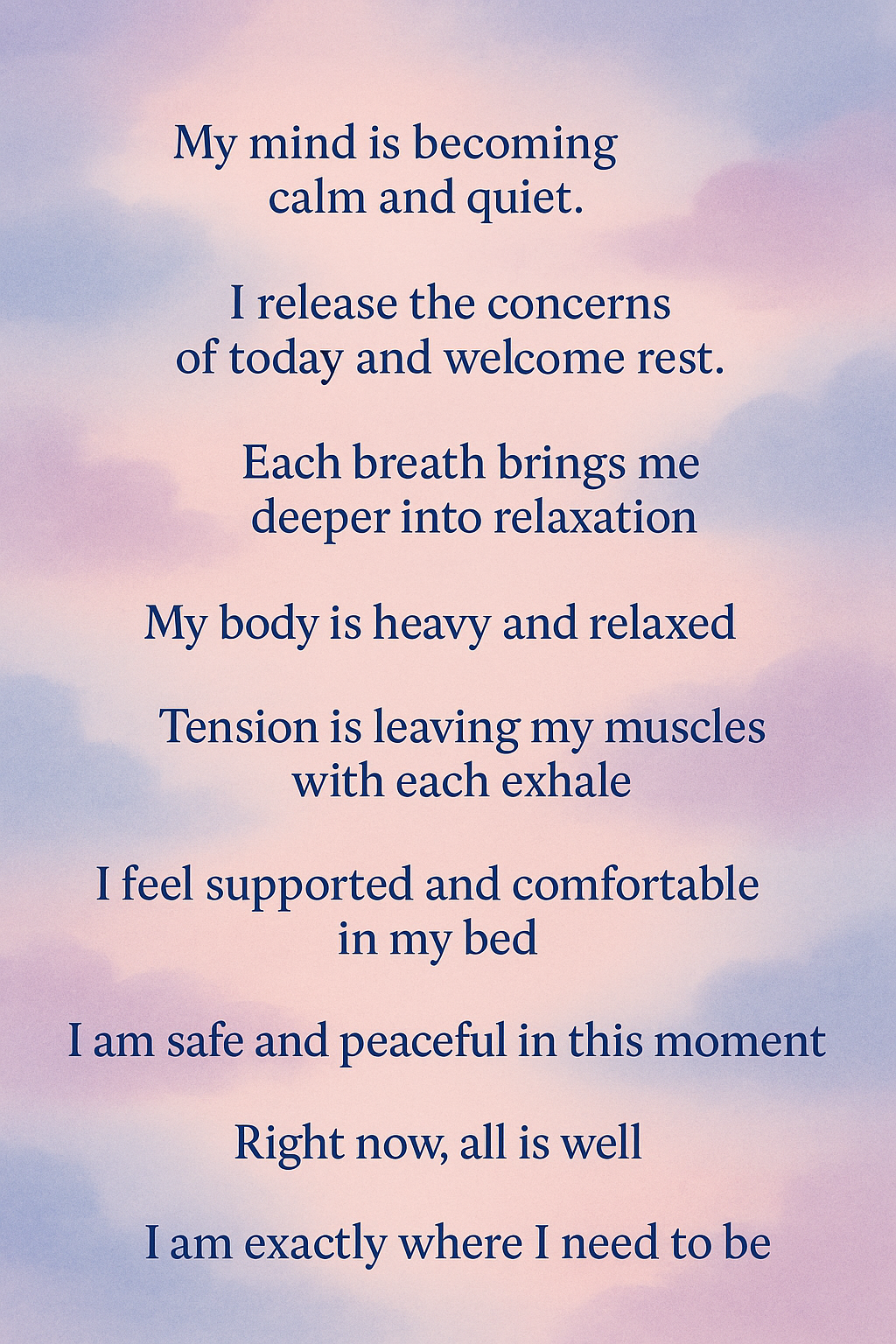.jpg)
For many adults, nighttime brings a familiar challenge: the inability to quiet an overactive mind. Racing thoughts about daily responsibilities, unfinished tasks, and future concerns can create a persistent state of mental arousal that interferes with the natural transition to sleep. Sleep affirmations - positive, calming statements repeated before or during bedtime - offer a scientifically-supported approach to addressing this common sleep disruption.
We asked Dr. Suzanne Gorovoy, Sleep Expert, Clinical Psychologist, Behavioral Sleep Medicine Specialist what her experience and practice in sleep science can tell us about affirmations. She says:
“Positive affirmations can reduce pre-sleep anxiety by shifting focus away from stress toward relaxation.”
In other words, this practice is a form of mental conditioning, leveraging the brain's own ability to adapt and change to quiet the noise and pave the way for restorative rest. Think of it as a gentle but powerful way to guide your mind from a state of stress to one of serenity and restorative sleep.

Research demonstrates that our brains possess remarkable adaptability through neuroplastic's ability to form new neural connections throughout life. Neuroimaging studies using functional magnetic resonance imaging (fMRI) have shown that self-affirmation activates the ventromedial prefrontal cortex, a brain region involved in positive valuation and self-related information processing. This process allows us to challenge and defeat self-sabotaging thoughts, similar to how repetitive physical exercise strengthens muscles.
When we consistently practice positive affirmations, we encourage our brain to take these positive statements as fact, creating mental pathways that can become our default response to stress. This neurological remodeling is particularly relevant for sleep, as it can help redirect the mind away from anxiety-provoking thoughts toward more peaceful mental states.
The relationship between stress and sleep involves complex physiological systems, particularly the hypothalamic-pituitary-adrenal (HPA) axis. Sleep deprivation activates the HPA axis, leading to increased cortisol production, while elevated cortisol levels can subsequently interfere with sleep quality and duration. Studies show that even partial sleep deprivation‚ getting as little as 5.5 hours of sleep, can cause increased cortisol levels the following evening.
Research indicates that elevated cortisol levels during sleep increase brain activity, reduce slow-wave sleep, and increase nighttime awakenings. This creates a problematic cycle where poor sleep leads to higher stress hormones, which in turn make quality sleep more difficult to achieve.
Dr. Areti Vassilopoulos, Sleep Expert, Pediatric Health Psychologist, Assistant Professor of Child Psychology says this about self affirmations:
“Mindful repetition of calming phrases helps engage the parasympathetic nervous system, preparing the body for rest.”
Ultimately, repeating affirmations before bed helps to calm the mind down and get your brain ready for sleep. Clinical studies have demonstrated that self-affirmations can decrease stress and have been used effectively to help people improve sleep issues, increase physical activity and improve dietary habits. Research suggests that individuals who practice positive affirmations may experience reduced production of cortisol and increased self-confidence.
A large number of anxiety sufferers experience disturbed sleep, and since affirmations can help relieve anxiety, they may have beneficial effects in promoting better sleep. Additionally, research suggests that mindfulness-based stress reduction, which often incorporates affirmational elements, can significantly improve sleep quality.
Sleep affirmations function through several interconnected mechanisms:
Attention Redirection: Rather than fighting anxious thoughts, affirmations provide a focal point that gently redirects attention away from worry and toward calming concepts.
Stress Response Modulation: Positive affirmations may activate brain regions associated with self-related processing and reward, leading to reduced neural activity in areas associated with threat processing.
Cognitive Restructuring: Regular practice helps replace negative thought patterns with more balanced, sleep-conducive mental habits.
The practice of sleep affirmations can influence several physiological systems:
Dr. Samantha Domingo, Sleep Expert, Clinical Health Psychologist:
"Many sleep problems are behavioral at their core and can be reversed with proper strategies."
In other words, sleep problems are primarily psychological and affirmations are one of the ways in which sleep issues can be reversed. Research on self-affirmation theory provides guidance for creating effective statements:
Present Tense Formulation: Affirmations work best when phrased as if they're already happening rather than as future goals.
Personal Relevance: Affirmations should use real strengths or values that you consider important to guide the statements.
Emotional Connection: The most effective affirmations are those that feel genuine and believable rather than overly idealistic.
Specific Focus: Target the particular aspects of deep sleep or relaxation that are most challenging for you.
Sleep difficulties often stem from specific underlying issues that keep our minds and bodies from transitioning into rest. The following affirmations are designed to address the most common barriers to quality sleep, helping you counteract the thought patterns and physical tensions that interfere with natural sleep processes.
When your mind won't stop churning through worries, tomorrow's to-do list, or replaying the day's events, it triggers your body's alert system and keeps cortisol levels elevated. This mental hyperactivity creates a state directly opposite to what's needed for sleep onset.
Stress, poor posture, physical discomfort, or the habit of carrying tension in your shoulders, jaw, or other muscle groups creates physical barriers to sleep. When your body is tight and uncomfortable, it sends alerting signals to your brain that prevent the natural relaxation response needed for deep sleep.
Past experiences with insomnia, sleep anxiety, or negative associations with bedtime can create a cycle where you approach sleep with dread or doubt. This anticipatory anxiety about not sleeping actually prevents sleep by activating your stress response and creating performance pressure around what should be a natural process.
When your mind jumps between past regrets and future anxieties, or gets caught up in hypothetical scenarios and problem-solving, it pulls you away from the present moment where sleep actually occurs. This mental time-traveling keeps your nervous system activated and prevents the here-and-now awareness that facilitates sleep onset.
Timing: Begin repeating your chosen affirmations as soon as you get into bed, or during a pre-sleep relaxation routine. The goal is to interrupt anxious or stimulating thought patterns before they gain momentum and impact your sleep cycle.
Technique: Repeat each affirmation slowly and deliberately, either silently or in a whisper. Focus on the meaning of the words rather than just reciting them mechanically. Pair affirmations with slow, deep breathing for enhanced effectiveness.
Personalization: Select 3-5 affirmations that most directly address your specific sleep challenges. You may find that different affirmations work better on different nights, depending on what's keeping you awake.
Sleep hygiene includes habits and routines throughout the day that support quality sleep. Sleep affirmations are most effective when integrated into a broader approach to healthy sleep practices and sleep environments:
Research supports combining affirmations with structured breathing techniques. The 4-7-8 breathing method (inhale for 4 counts, hold for 7, exhale for 8) can enhance the relaxation response when paired with affirmational practice.
While sleep affirmations can be beneficial for many individuals, they are not a substitute for professional treatment of sleep issues when needed. Consider consulting a healthcare provider or sleep specialist if you experience:
Current research on affirmations shows that their effectiveness may vary depending on individual differences and context. Additionally, while studies support the use of affirmations for various psychological and physical benefits, more research is needed to fully understand the specific mechanisms involved.
For individuals with persistent sleep difficulties, Cognitive Behavioral Therapy for Insomnia (CBT-I) represents the gold standard treatment, with research showing significant improvements in both short-term and long-term sleep quality. CBT-I addresses the root causes of sleep problems through cognitive restructuring and behavior modification techniques.

Sleep affirmations represent a scientifically-informed approach to addressing common sleep challenges through the strategic use of positive, calming statements. Research demonstrates that self-affirmation can activate brain systems associated with self-related processing and reward, potentially helping to establish more adaptive sleep-related thought patterns.
While not a universal solution, sleep affirmations can serve as a valuable component of a comprehensive approach to sleep health, particularly when combined with established sleep hygiene practices and, when necessary, professional treatment. The practice offers a low-risk, accessible tool that individuals can use to develop a more peaceful relationship with bedtime and potentially improve their overall sleep quality.
For those seeking additional support with persistent sleep challenges, resources such as Sleep Reset offer evidence-based programs that integrate cognitive behavioral techniques with personalized coaching through sleep apps to address the root causes of sleep difficulties. Their comprehensive approach to sleep hygiene and anxiety management provides additional tools for improving sleep quality naturally. If you are experiencing a rush of anxiety or adrenaline whenever you try to sleep and want to break the cycle, or if you are always tired, try this 10-3-2-1-0 rule and CBTI for better sleep.
Take our Sleep Calculator and Chronotype Quiz to learn more about your sleep personality! If you're struggling with jet lag, try our Jet Lag Plan!

Dr. Areti Vassilopoulos | Psychologist | Sleep Medicine Expert
Dr. Vassilopoulos is the Clinical Content Lead for Sleep Reset and Assistant Professor at Yale School of Medicine. She has co-authored peer-reviewed research articles, provides expert consultation to national nonprofit organizations, and chairs clinical committees in pediatric health psychology for the American Psychological Association. She lives in New England with her partner and takes full advantage of the beautiful hiking trails.